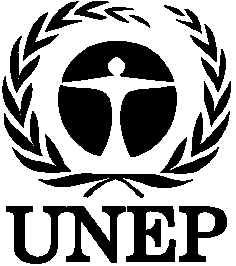
UNITED NATIONS
ENVIRONMENT PROGRAMME

|
|
|
ELIMINATION OF 10 INTENTIONALLY PRODUCED PERSISTENT
ORGANIC POLLUTANTS FAVOURED BY TREATY NEGOTIATORS;
HEALTH NEED FOR DDT EXEMPTION SEEN
NAIROBI/GENEVA, 13 September 1999 - In the third round of talks on a global treaty, held from 6-11 September 1999 in Geneva, negotiators reached agreement on proposals favouring the elimination of the 10 intentionally produced persistent organic pollutants (POPs) in the mandate for a treaty from the Governing Council of the United Nations Environment Programme (UNEP). At the same time, the negotiators recognized the public health need for an exemption for DDT, used in controlling vector-borne diseases, such as malaria.
Their proposals now go to participating countries for consultation, followed by consideration at the fourth round of negotiations, set for 20-25 March 2000 in Bonn. One hundred and fifteen countries participated in the talks in Geneva, working with 17 intergovernmental and 72 non-governmental organizations, bringing the total number of participants to more than 420.
"This was a breakthrough meeting in protecting public health and the environment against these persistent organic pollutants," said Klaus Toepfer, Executive Director of UNEP. "Concrete proposals were put forth to bring about an end to some of the worst pollutants of the 20th century. In addition, important gains were made in establishing scientific criteria and a procedure for identifying additional persistent organic pollutants for international action, thus building safeguards for the future."
On the DDT issue, Toepfer said, "Negotiators found the proper way forward to provide protection from malaria and other vector-borne diseases by recognizing a need for the use of DDT while countries move toward ultimate phase-out. This approach is a win-win situation: fewer cases of malaria and less use of DDT." UNEP is a full partner in the action plan of the World Health Organization (WHO) to reduce reliance on DDT for vector control while fully protecting public health.
Three of the 12 POPs in the UNEP mandate are slated for elimination with no exemptions. These are the pesticides aldrin, endrin and toxaphene. Another five POPs are set for elimination, with limited country-specific exemptions. These are the pesticides chlordane, dieldrin, heptachlor, mirex, and hexachlorobenzene, which is also an industrial compound and a by-product. With the exception of the exemptions, elimination would take place once the treaty enters into force.
While production and use of DDT would be limited to control of vectors, such as mosquitos transmitting malaria, for public health purposes, all other uses, including in agriculture, would be prohibited. Proposals under discussion suggest continuous review, in consultation with WHO, of the need for DDT in vector control; the availability of safer, effective, and affordable alternative approaches to DDT; and the capacity of countries to pursue such alternative control strategies, with the ultimate goal of elimination.
New use and production of polychlorinated biphenyls (PCBs) would be prohibited, under policy proposals developed by negotiators. Discussion focused on the issue of PCBs already in use, principally in electrical equipment, and the related complexity of identifying existing applications and dealing with replacement costs, particularly in developing countries.
There was agreement on a procedure for adding chemicals to the convention. With the exception a few remaining issues, the meeting also agreed on scientific criteria and data requirements for screening and evaluation.
The talks moved towards a consensus on the unintentionally produced by-products dioxins and furans. They also laid the groundwork for further consideration of proposals to advance technical and financial assistance, particularly for developing countries and countries with economies in transition, to enable implementation of the treaty.
The meeting is formally known as the Third Session of the Intergovernmental Negotiating Committee (INC-3) for an International Legally Binding Instrument for Implementing International Action on Certain Persistent Organic Pollutants. It builds on the foundation for a treaty laid at the First Session (INC-1) held in Montreal from 29 June to 2 July 1998, and the Second Session (INC-2) held in Nairobi 25-29 January 1999. The negotiations are in response to the mandate from the UNEP Governing Council to reach agreement in the year 2000 on a treaty to reduce and/or eliminate 12 specific POPs and to establish scientific criteria and a process of identifying additional pollutants for future international action.
Note to journalists: Official documents and other information on POPs are available at www.chem.unep.ch/pops/ and from UNEP Chemicals in Geneva. For additional information or to arrange interviews, contact: Linda Durkee, Policy and Communications Advisor, UNEP Chemicals, at tel: (+41 22) 917 85 11; fax: (+41 22) 797 34 60; e-mail: ldurkee@unep.ch or Tore J. Brevik, UNEP Spokesman and Director of Information, Communications and Public Information, P.O. Box 30552, Nairobi, Kenya; Tel.: (254-2) 623292, Fax: 623927 email tore.brevik@unep.org
UNEP News Release NR99/102